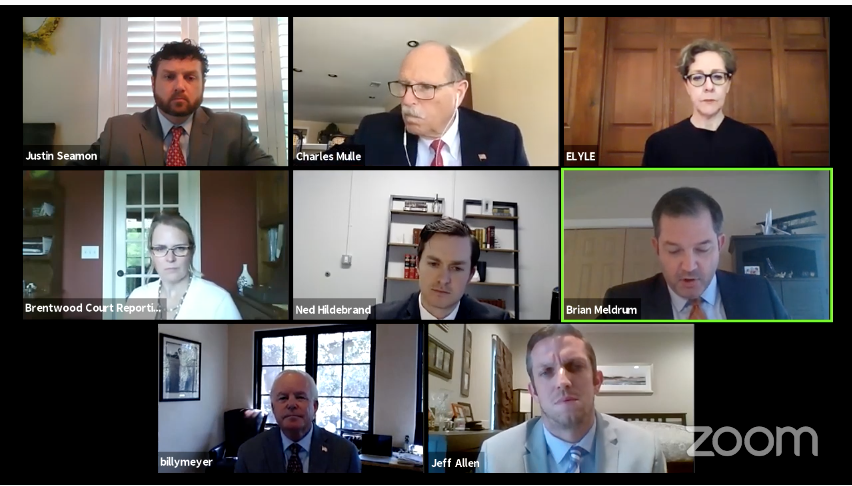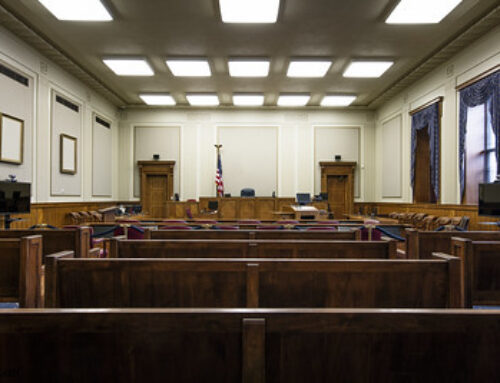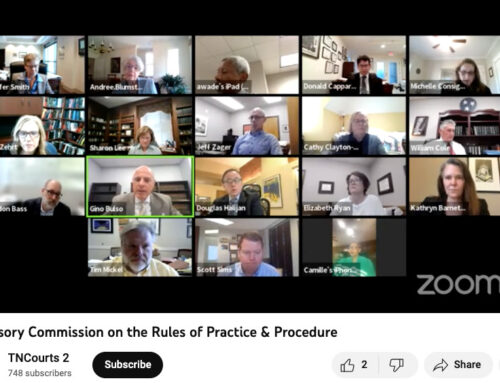Most Tennessee COVID-19 court plans offer no provisions for public, media access

Most judicial districts that have submitted COVID-19 plans to the Tennessee Supreme Court to resume in-person proceedings — and increase electronic proceedings — offer no guidance on how their courts will operate transparently and openly going forward.
A review of 26 judicial plans shows that the vast majority intend to allow only litigants, their attorneys and those directly involved in a case into the courtroom. Only one of the plans references public access to electronic proceedings.
The plans offer a first-time look at how hundreds of courts in Tennessee — from chancery courts to general sessions and municipal courts — are struggling with resuming more business in what is often a center of teeming public activity: local courthouses and government buildings.
So far, most plans bar members of the general public — and presumably the news media — from in-person proceedings and offer almost no guidance on how the courts might provide access to proceedings through either live-streaming, broadcasting or audio or video recordings.
Some plans say crime victims will be allowed to attend in-person proceedings, but others make no specific provisions for victims. Several plans limit the number of friends and family a defendant can have with them in court.
Only seven of the 26 plans include a method for members of the media to attend in-person or electronic proceedings.
And even fewer have provisions that would allow general members of the public who are not participants in a case to view proceedings.
Many of the plans outline new safety procedures for in-person proceedings, including requiring check-in by participants either in a parking lot or security stations to make sure they are on the docket, temperature readings, and answering questions to determine whether they might have been exposed to COVID-19 before being allowed inside. A few require masks to be worn, but most simply encourage it. Almost all limit the number of people in a courtroom to 10, and say that courthouse security will monitor and enforce social distancing outside the courtrooms.
The plans are filled with references to concerns about shortages of hand sanitizer and touch-less thermometers, as well as the backlog of cases that are growing by the day.
Some judicial districts have not submitted plans yet
There are 31 judicial districts in Tennessee. As of Wednesday, 26 were listed on the COVID-19 Judicial District Plans web page, indicating some have either not submitted plans, or had them approved yet.
Some courts, such as in Davidson County in Judicial District 20 (which is not among the districts that have had a plan approved), have listed their own guidance for court business on their website. Some individual judges, such as Chancellor Ellen Lyle, have specifically given instructions and contact information to listen to or view a proceeding. Lyle, for example, includes a link to her court’s YouTube channel.
But a check of court websites in many other counties do not have similar notices prominently displayed instructing the public or the news media about access.
Tennessee Supreme Court calls for ‘comprehensive written plans’
The Tennessee Supreme Court has issued three orders on court operations during the COVID-19 pandemic.
The first order on March 13 suspended in-person court proceedings in light of the COVID-19 pandemic, with some exceptions, such as proceedings related to temporary injunctive relief and those related to emergencies, such as protective orders and public health. The order urged all judges and court clerks to use teleconferencing and video conferencing to take care of business, and said that any “permitted in-court proceedings shall be limited to attorneys, parties, witnesses, security officers, and other necessary persons, as determined by the trial judge.”
On March 25, the Court continued most suspension of in-person proceedings through April 20, and updated the list of exceptions.
Finally, on April 24, the Court issued an order allowing the presiding judge of each judicial district in Tennessee to submit a “comprehensive written plan to gradually begin conducting in-person court proceedings (other than jury trials) in some non-emergency matters.”
The order continued suspension of jury trials through July 3 and urged the courts to conduct as much business as possible by means other than in-person court proceedings, even expanding telephone and video conferencing.
While each of the Supreme Court’s orders stated that “[j]udges are charged with the responsibility of ensuring that core constitutional functions and rights are protected,” no specific direction was given by the Supreme Court on how to preserve the traditionally open access to courts by the public, including by the press.
The Administrative Office of the Courts (AOC), in an FAQ published on its website, asked judges to be cognizant of the need to “keep proceedings open and available through recording audio and video conferences and/or allowing live access of proceedings that would otherwise be held in open court.” The office encouraged contacting the Office of the Courts for help.
The AOC reminded the judges that “Court proceedings in Tennessee are open to the public.”
Other states have taken a different approach
Some states have been specific in guidance for public access, even as courts have done more business through video conference.
For example, the Texas Supreme Court’s order dealing with COVID-19 procedures allows proceedings “away from the court’s usual location” but only “with reasonable notice and access to the participants and the public.”
Its Office of Court Administration sent instructions to all courts on how to set up a YouTube channel to stream proceedings and said that each court had to ensure that the public has “reasonable notice of where to observe the proceedings.”
The Texas office also informed courts that streaming hearings to YouTube satisfied the open court provisions “as long as the court provides notice of the streaming and makes the proceeding public.”
In Tennessee, the Administrative Office of the Courts has touted the progress made in Tennessee by judges who have embraced technology to keep business moving.
In an April 23 article on its web page, “Tennessee judges take lead in using technology to weather pandemic,” it noted that dozens of Zoom licenses and WebEx accounts have been installed across the state, and more than half of the judges had expanded their use of video conferencing.” A Court of Criminal Appeals judge said she was skeptical at first, but thought “Zoom can serve the public interest well.”
Most Judicial District COVID-19 plans do not allow public access
Despite the enthusiasm and urging by the Administrative Office of the Courts, few plans submitted to the Supreme Court list provisions for public access.
Of the Tennessee plans, only one — the Criminal Court in Hamilton County — referenced any plans to stream proceedings that are either conducted electronically or in-person:
“Members of the public and media may attend video conference proceedings as a room ‘participant.’ The Court may ‘mute’ the microphone of any person, including media representatives, who are not parties to the immediate proceeding. Media may also attend any in-person proceeding upon approval by the Criminal Court consistent with Tennessee Supreme Court Rule 30.”
But no information about streaming or how to access it is evident on the court’s website. A March 18 plan by the Hamilton County Criminal Court, which is on the court’s website, instructs members of the media to contact Barbara Peck with the Administrative Office of the Courts in Nashville to ask permission to attend an in-person proceeding. Journalists in other districts have reported similar procedures — funneling all requests to attend or view a court proceeding to the media office of the Nashville-based Administrative Office of the Courts.
Two plans — the 24th Judicial District (Benton, Carroll, Decatur, Hardin and Henry counties) and the 26th Judicial District (Chester, Henderson and Madison counties) — said they would set aside space for the media:
“Understanding that public access to the court is of utmost importance to the public and our judicial system, one location in every courtroom will be reserved for media, and one member of the media will be allowed into court proceedings on a first come basis. Current media credentials shall be presented before access will be granted.”
Two other plans — the 19th Judicial District (Montgomery and Robertson counties) and the 22nd Judicial District (Giles, Lawrence, Maury and Wayne counties) — indicated the news media would be allowed to attend if they sought permission ahead of time, referencing a Supreme Court rule that requires permission to bring camera equipment into a courtroom:
“Courtroom admission requirements shall not be applied…to preclude media coverage of any proceeding consistent with Rule 30 of the Rules of the Supreme Court.”
The 27th Judicial District (Obion and Weakley counties) and the 28th Judicial District (Crockett, Gibson and Haywood counties) also indicated prior permission would have to be sought from the court by media to attend in-person proceedings:
“MEDIA REQUESTS: Members of the media may attend any ‘in-person’ court proceeding consistent with Tennessee Supreme Court Rule 30, under the Court’s ‘safety protocols’.”
Supreme Court Rule 30, which was last amended in 1999, outlines the procedures a member of the media must take to receive permission to use television, radio, photographic or recording equipment in a courtroom. The rule specifically states that it “does not govern the coverage of a proceeding by a news reporter or other person who is not using a camera or electronic equipment.”




